Congratulations to Jacques Bertrand, Kajri Jain, Tania Li, Shivaji Mukherjee, Lynette Ong, and Joseph Wong on their recent publications! See more faculty publications on our Research page.
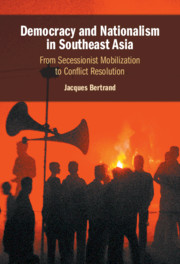 Democracy and Nationalism in Southeast Asia: From Secessionist Mobilization to Conflict Resolution (Cambridge University Press, 2021)
Democracy and Nationalism in Southeast Asia: From Secessionist Mobilization to Conflict Resolution (Cambridge University Press, 2021)
Author: Jacques Bertrand (Professor of Political Science and Director of the Collaborative Master’s Program in Contemporary East and Southeast Asian Studies)
Read a Q&A with Jacques Bertrand about his book.
Jacques Bertrand offers a comparative-historical analysis of five nationalist conflicts over several decades in Southeast Asia. Using a theoretical framework to explain variance over time and across cases, he challenges and refines existing debates on democracy’s impact and shows that, while democratization significantly reduces violent insurgency over time, it often introduces pernicious effects that fail to resolve conflict and contribute to maintaining deep nationalist grievances.
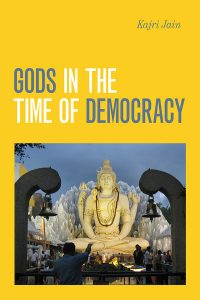 Gods in the Time of Democracy (Duke University Press, 2021)
Gods in the Time of Democracy (Duke University Press, 2021)
Author: Kajri Jain (Professor of Department of Visual Studies, UTM, and History of Art, UTSC)
In 2018 India’s prime minister, Narendra Modi, inaugurated the world’s tallest statue: a 597-foot figure of nationalist leader Sardar Patel. Twice the height of the Statue of Liberty, it is but one of many massive statues built following India’s economic reforms of the 1990s. In Gods in the Time of Democracy Kajri Jain examines how monumental icons emerged as a religious and political form in contemporary India, mobilizing the concept of emergence toward a radical treatment of art historical objects as dynamic assemblages. Drawing on a decade of fieldwork at giant statue sites in India and its diaspora and interviews with sculptors, patrons, and visitors, Jain masterfully describes how public icons materialize the intersections between new image technologies, neospiritual religious movements, Hindu nationalist politics, globalization, and Dalit-Bahujan verifications of equality and presence. Centering the ex-colony in rethinking key concepts of the image, Jain demonstrates how these new aesthetic forms entail a simultaneously religious and political retooling of the “infrastructures of the sensible.”
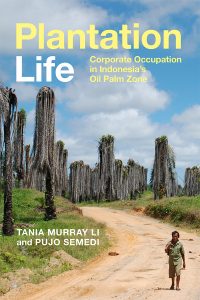 Plantation Life: Corporate Occupation in Indonesia’s Oil Palm Zone (Duke University Press, 2021)
Plantation Life: Corporate Occupation in Indonesia’s Oil Palm Zone (Duke University Press, 2021)
Authors: Tania Li (University Professor, Department of Anthropology) and Pujo Semedi (Universitas Gadjah Mada)
In Plantation Life Tania Murray Li and Pujo Semedi examine the structure and governance of Indonesia’s contemporary oil palm plantations in Indonesia, which supply 50 percent of the world’s palm oil. They attend to the exploitative nature of plantation life, wherein villagers’ well-being is sacrificed in the name of economic development. While plantations are often plagued by ruined ecologies, injury among workers, and a devastating loss of livelihoods for former landholders, small-scale independent farmers produce palm oil more efficiently and with far less damage to life and land. Li and Semedi theorize “corporate occupation” to underscore how massive forms of capitalist production and control over the palm oil industry replicate colonial-style relations that undermine citizenship. In so doing, they question the assumption that corporations are necessary for rural development, contending that the dominance of plantations stems from a political system that privileges corporations.
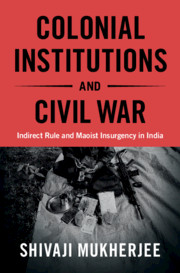 Colonial Institutions and Civil War: Indirect Rule and Maoist Insurgency in India (Cambridge University Press, 2021)
Colonial Institutions and Civil War: Indirect Rule and Maoist Insurgency in India (Cambridge University Press, 2021)
Author: Shivaji Mukherjee (Assistant Professor of Political Science, UTM)
What explains the peculiar spatial variation of Maoist insurgency in India? Mukherjee develops a novel typology of colonial indirect rule and land tenure in India, showing how they can lead to land inequality, weak state and Maoist insurgency. Using a multi-method research design that combines qualitative analysis of archival data on Chhattisgarh and Andhra Pradesh states, Mukherjee demonstrates path dependence of land/ethnic inequality leading to Maoist insurgency. This is nested within a quantitative analysis of a district level dataset which uses an instrumental variable analysis to address potential selection bias in colonial choice of princely states. The author also analyses various Maoist documents, and interviews with key human rights activists, police officers, and bureaucrats, providing rich contextual understanding of the motivations of agents. Furthermore, he demonstrates the generalizability of his theory to cases of colonial frontier indirect rule causing ethnic secessionist insurgency in Burma, and the Taliban insurgency in Pakistan.
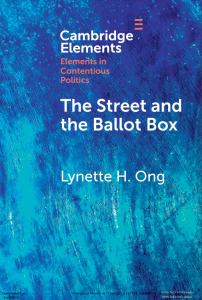 The Street and the Ballot Box: Interactions Between Social Movements and Electoral Politics in Authoritarian Contexts (Cambridge University Press, 2022)
The Street and the Ballot Box: Interactions Between Social Movements and Electoral Politics in Authoritarian Contexts (Cambridge University Press, 2022)
Author: Lynette Ong (Associate Professor, Department of Political Science and Asian Institute)
How do discontented masses and opposition elites work together to engineer a change in electoral authoritarian regimes? Social movements and elections are often seen as operating in different terrains – outside and inside institutions, respectively. In this Element, Lynette Ong develops a theory to describe how a broad-based social movement that champions a grievance shared by a wide segment of the population can build alliances across society and opposition elites that, despite the rules of the game rigged against them, vote the incumbents out of power. The broad-based nature of the movement also contributes to the cohesion of the opposition alliance, and elite defection, which are often crucial for regime change. This Element examines the 2018 Malaysian election and a range of cases from other authoritarian regimes across Asia, Eastern Europe, and Africa to illustrate these arguments.
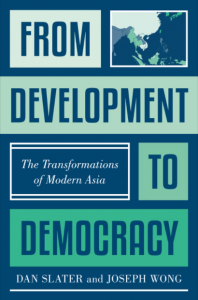 From Development to Democracy: The Transformations of Modern Asia (Princeton University Press, 2022)
From Development to Democracy: The Transformations of Modern Asia (Princeton University Press, 2022)
Authors: Joseph Wong, (former Director of the Asian Institute; Professor of Political Science; and Roz and Ralph Halbert Professor of Innovation, Munk School of Global Affairs & Public Policy) and Dan Slater (University of Michigan)
Over the past century, Asia has been transformed by rapid economic growth, industrialization, and urbanization—a spectacular record of development that has turned one of the world’s poorest regions into one of its richest. Yet Asia’s record of democratization has been much more uneven, despite the global correlation between development and democracy. Why have some Asian countries become more democratic as they have grown richer, while others—most notably China—haven’t? In From Development to Democracy, Dan Slater and Joseph Wong offer a sweeping and original answer to this crucial question.